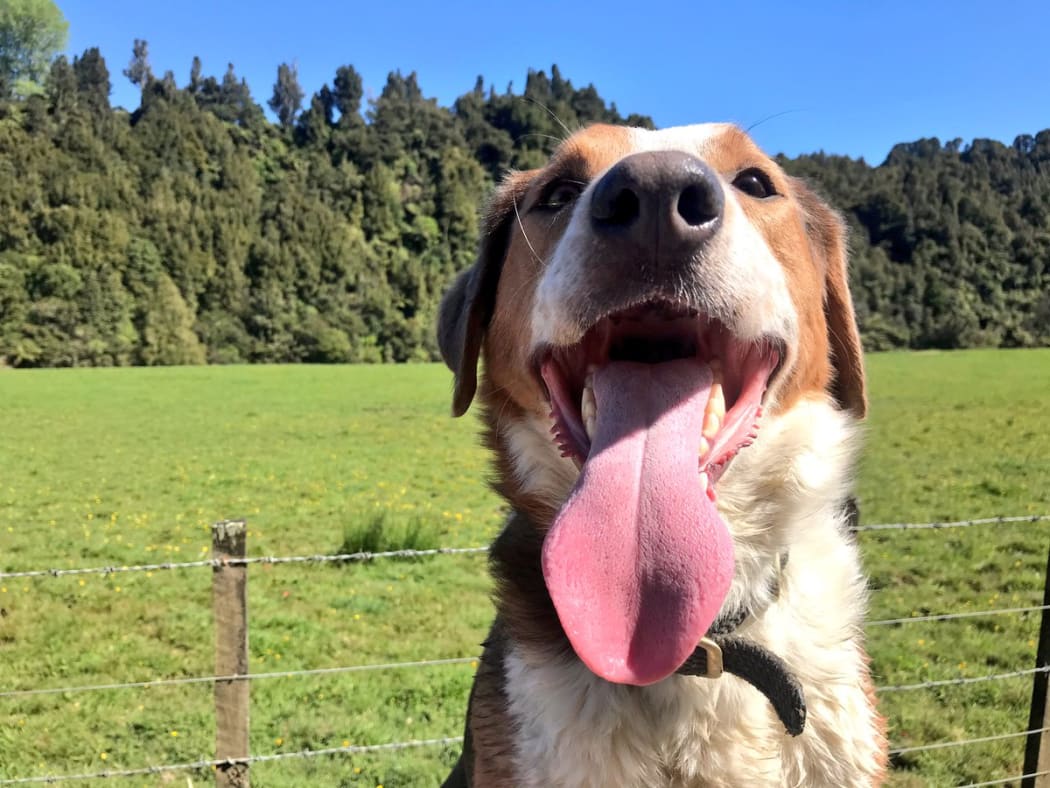Northland had been pegging along ok compared with the rest of the country but is now drying out fast. There's so much rank - dry seed heady grass - about, it could be a fire risk. Stock seem to be handling the hot dry conditions. It has been a good growing season for animals.

Photo: supplied Sophie Barnes
Around Pukekohe all crops are thirsty but they are often not getting enough to drink because there are not enough irrigators to go around or there's a shortage of water. Hard dry ground has developed into deep cracks in potato fields which is allowing the tuber moth to jump in and damage the crop. There could be a lot of rejected potatoes because of the moth as well as insufficient moisture in the growing cycle. Late sown onions are being hit hard by various insect pests too.
In Waikato all eyes are on the long term forecast - it looks like a tropical cyclone building up near New Caledonia might deliver rain next weekend and that would be a huge relief. It's crispy underfoot on farms and tinder dry. We're told if you sneeze the clover falls apart. Some farmers are starting to green feed the maize growing in the paddocks - rather than waiting to harvest it all. They get a chopper in and chop up a small section, put it in their trailer and dish it out to the cows; they love it! Right now they are getting more than half their daily needs from feed other than grass.
Bay of Plenty is very dry but there have been some lovely heavy dews. Farmers are starting to make some serious decisions about off-loading stock - lambs are really struggling in the heat. January delivered just 42 millimeters of rain and there's been none since the 24th. Dairy farmers are looking at dropping to once a day - for both feed reasons and for animal welfare reasons - walking the cows to the shed in the full sun in 34 degree heat is hard on them.
Avocado crop
The Bay's avocado growers are pleased the season is over. The last exports left a week ago. It has been a very difficult season - there was an overestimation of the crop which made things difficult for exporters, wet weather early in the season made picking tricky and there have been problems with storage and rot so it's been a challenge to keep the quality up in the marketplace. On top of that prices were down. Growers will receive about $18 to $20 a tray. Last year there were record returns of $30 to $40 a tray. The good news is the fruit set for next year is indicating there'll be a large crop.
In Taranaki the heat is causing milk production to slip away. Coastal North Taranaki s very dry. There is a lot of feeding out taking place and, because of the shortage of feed, animals are being culled. If steady rain arrives soon though, the Province should recover very quickly.
The Gisborne region is the envy of the country. It's had enough rain every two weeks keeping it ticking over and is swimming in feed. Sheep and beef farmers are in a great spot. Ag consultant Stephen Thomson tells us he is thrilled with the success of Surfing for Farmers - an activity he's set up to get farmers off the farm. On Tuesday afternoons farmers gather at Midway beach and dive into the surf. He says they only have 25 surf boards but between 45 and 50 farmers are turning up each week. There are surfing coaches to give the farmers a few tips and a barbecue afterwards. Stephen says everyone's talking about mental health but he wanted to do something about it and says there's something about salt water and getting amongst it. Some farmers travel for more than an hour over dirty gravel road to come surfing - it's free for them - thanks to the $11,000 worth of sponsorships Stephen's been able to drum up.

Photo: RNZ/Susan Murray
Hawke's Bay grape vines are enjoying the heat - they are well into veraison which is when the colour changes, the berries soften and they start to look like the bunches of grapes you see in the supermarket. The early varieties are a month away from harvest and the nets are going on. The grower we spoke to is yet to turn on his irrigation system - it might happen next week - he usually flicks the switch in November! It was very wet early in the season and that's made for a hugely labour intensive few months for grape growers who have been battling to contain all the growth, working to keep the grass in vineyards under control and trying to keep on top of downy mildew. On pastoral farms heavy crops of hay are being made.
Conditions in Hawkes Bay have been brilliant for bringing up the colour in apples - there've been cool night and foggy mornings.
Big Dry
Wairarapa is exceptionally dry all of a sudden. This month's only seen a few millimetres of rain fall. Water restrictions are being looked at for Masterton and maize harvesting's being started now, about a month early because the crop's going off. This is coming after a frantic two weeks of barley harvesting; that one was held up by earlier damp conditions. On dairy farms milk production is dropping. Vineyard managers of course are very happy with the current conditions.
Horowhenua has had a few drops of rain - not enough. Vegetable crops are being irrigated.
South Island
Across Cook Strait and in Tasman as everyone recovers from the devastating fires a severe drought is enveloping the region. Water restrictions are in place around Nelson as rivers and aquifer levels continue dropping. There's been no rain to speak of since Christmas. From Monday onwards on the Waimea Plains, irrigation restrictions will go down to 35 percent of the normal water allocation. Fruit growers will need to make decisions about which blocks to turn water off to and the economic consequences of doing that. Early apple and pear harvesting starts next week.
Marlborough has been hot so perfect conditions for grape growing - as long as growers can get water to the vines. This is challenging as the Southern Valley Water scheme has been turned off so the water needs to come from elsewhere. Some vineyards are trucking water in but this is expensive, while others have dams for when this happens and they have a three-week watering capacity. Spraying for powdery mildew and botrytis is continuing as harvesting gets nearer. On hill country farms the Ram is going out in four weeks so ewes are being brought in for condition scoring. Any on the light side will be given an extra meal or two and they are all going onto a high protein diet now to help up conception rates.
Hot Coast
It has been very hot on the West Coast. A farmer at Runanga says they have had a good dose of rain and it was needed as the heat dries out the ground quickly. When we called he was working up a paddock in his tractor. He'd burnt it off yesterday as part of a redevelopment plan to get rid of rushes and gorse. Milk production is still up on last year on most farms, pregnancy testing results are looking okay and cows are moving onto the summer turnip crop.
Another hot dry week in Mid-Canterbury allowed arable farmers to make full advantage of the conditions. The bulk of the harvest has been done with later crops still to go. Pasture growth has slowed with the heat over the last few weeks. As a result the majority of dairy farms are feeding supplements.
Fire hazard
The biggest issue for everyone at the moment in Central Otago is the fire hazard but the threat was dampened on Thursday night after 8mm of rain. Everyone's making tons of hay. One farmer at Oturehua says there are two winters' worth in the shed already! Lambs are heading to the freezing works. It's taken longer to finish them this season as there's been so much growth and they actually prefer it when feed is shorter. Farmers are fly control crutching and early autumn shearing is underway.
Eastern Southland had a bit of rain this week and more will be welcomed as it has been a dry summer. Grass is still growing but some ridges have browned off. As a result, the swede crop for winter is struggling but fooderbeet is doing okay. Mating results for dairy cows are looking mediocre due to the stop start growth rates and poor grass quality. In milk production, farmers who have been throwing supplementary feed at cows are up on last year. In fact our contact who farms between Edendale and Mataura is up 15 percent so a great season for him so far.

